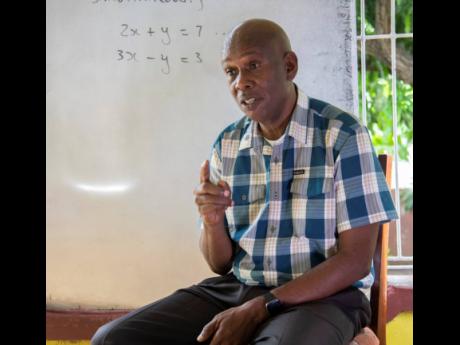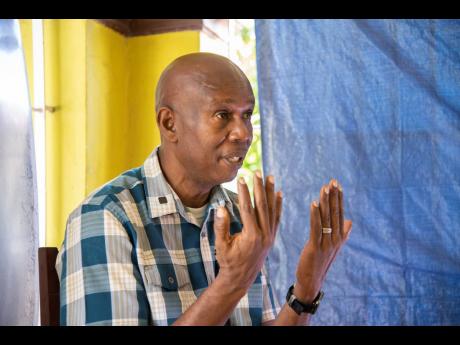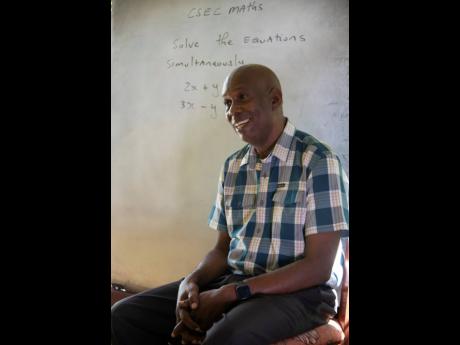Robert Rowe: A lighthouse in Rollington Town
Educator empowering young boys and girls to mathematics success
The once-thriving community of Rollington Town in Kingston still shows signs of its former glory of large middle-class houses on sizeable lots with 60-year-old architecture and matured fruit trees of varying types throughout the area.
Pothole-riddled roads now run through the community, sections of which have been scarred by the scourge of violence plaguing the country. Still, it is faring better than some of its most prominent neighbours, where blood stains the streets daily as residents yearn for just a week of peace.
But somewhere in the wider desert of social and criminal depravity is an oasis. On St James Street to be exact. At the home of educator Robert Rowe and his wife, who is a social worker.
Rowe has transformed the verandah of his humble abode into a classroom, from which he has been delivering lessons in mathematics for nearly three decades.
What started out as a family initiative to lift the standard of mathematics passes in the family has now become a fixture and on any given Sunday, even during the heights of the COVID-19 pandemic, and between 9 a.m. and 7 p.m. classes are in session.
The students range from all age groups – from primary school children to tertiary pupils and beyond. Everyone seeking to master the subject is welcome. And among his successes is a retiree who he guided to pass mathematics in the Caribbean Secondary Education Certificate exams after age 60.
“I have been teaching for more than 35 years, teaching at various levels. I am very passionate about teaching and dedicated to the teaching profession,” Rowe, who teaches at the Excelsior Community College, told The Sunday Gleaner last week. “There are inadequacies in the profession, but I do not try to let those deter me. I am still steadfast and committed to my students and over the years, I have had many successes, and that keeps me motivated to go on.”
Though not paper-certified, Rowe is a perfect example of someone with skills, competence and capacity without formal training.
Although he previously enrolled in various mathematics programmes at different tertiary institutions, he discontinued those studies for lack of funding. And that reality has made him welcome even those who do not have the $400 he charged for the two-hour sessions on Sundays, a fee he recently bumped up to $500 after many years. He has also funded students’ examination fees from his own pocket.
Rowe relies strongly on the chalk-and-talk method – in his case, marker and eraser – but is not afraid to use war games to help students, especially the boys, to understand the principles.
The educator has a roomful of books to teach himself, not only about the most up-to-date matters in the subject, but its psychology.
Up to recently, he was enrolled in a Walden University online programme, but that, too, was discontinued, but his quest for completion is not diminished.
SPARKING THE PASSION
Rowe strongly believes that thousands of Jamaicans who now dislike or “cannot do” mathematics were never taught to love and appreciate the subject using life experiences. And Rowe believes boys should be taught differently, as many of them are afraid to excel, falling victim to female pressure.
Through the Walden programme, he is afforded the opportunity to see behind the problems of teaching the subject, plus he wanted an “international flavour to the way the subject is taught”.
Rowe keeps parents updated on the progress of his Sunday students, telling The Sunday Gleaner that the few cases of less-than-stellar performances result from a lack of parental support at home. Many parents, he lamented, see schools as mere daycare centres.
“This programme started in the family. There was a need for me to teach my younger brother at the time, and I, being the first one in the family to go to high school (St George’s College), I wanted him to have the same success I had with mathematics. He was going to Camperdown [High] at the time,” Rowe explained, adding that some schools have and provide more facilities for students to excel.
Rowe had his brother transferred to St George’s and promised the principal that he would fix whatever deficiencies he had in maths. And he did, this while studying in one of the programmes he took at The University of the West Indies, Mona. He would later become the custodian of mathematics success in his family, teaching his sister and another brother.
Rowe’s love for mathematics began to grow with the influence of one of his teachers at Windward Road Primary, who helped him to develop a greater appreciation for it after another teacher at Rollington Town Primary whet his appetite.
After not being successful in his first attempt at the then primary school exit examination, Common Entrance, his mother moved him from under the tutelage of that teacher at Rollington Town and placed him under the wings of Mr Duncan at Windward Road Primary. There, his love and empowerment began.
He would later teach the daughter of his Rollington Town teacher, bringing her success, in a classic example of the circle of life.
“She was a very compassionate teacher and sometimes compassion speaks louder than academic brilliance. You don’t have to be brilliant to impact your students; you just have to care, and she cared a lot,” Rowe said. “From time to time, I would go and visit her, and one day, ... she asked me, ‘Can you teach my child mathematics?’
“I asked her how she knew I could help, and she said, ‘Yes, man. I believe in you.’ She sent her daughter here – she was going to Holy Childhood at the time – and I prepared her and she got a grade one,” he explained.
That success became his recommendation to other secondary school students. Now his reputation precedes him, and he has even taught the children of some of his former students.
ACCESSING GOLDEN OPPORTUNITIES
Rowe has adopted non-cultural methods to teach the subject. He uses the Japanese model with diagrams to teach multiplication to the younger kids and he showed how to use his fingers to teach the nine-times table. But these are relatively simple. The more complex areas require ingenuity, planning and knowledge of each student and their ability, he noted.
“My programme is diversified and multifaceted. I teach them time management, [and] how to memorise stuff to make the magic work. I motivate and encourage students to do their best,” Rowe told The Sunday Gleaner.
“I am against corporal punishment. I am against ridiculing a student. You can find more decent ways to discipline your child. What teachers say in the comments they write about children’s works in their books or on their report cards is crucial to their motivation and success. You shouldn’t just praise the final output but the effort. So the way we distribute rewards is crucial to their success,” he added.
He believes grading is used to discriminate, rather than motivate, and wants students to be given a second opportunity to improve on their scores. Noting that it is done in the United States, where he taught several years ago, Rowe said that system is designed to give students an opportunity to do better. The same concepts are tested, but the questions may be changed to allow the students to do better.
“What you are teaching that child is that the final result is not what characterises you, but the progress over time tells the true picture,” he said.
Rowe also believes many young persons were missing out on the golden opportunities that education provides to transform their lives and those of their relatives.
“With education, you can make sounder decisions and think more critically. You can earn financially through education, but they may look at me and say, ‘Why are you not as rich as you say?’ But, I always tell them that it’s not because I don’t have that ambition, but [because] I am comfortable [and] easily satisfied. But I have to change that [now] since I have been married,” he told The Sunday Gleaner.
With poor remuneration driving many local teachers overseas, Rowe is also seriously thinking of a second stint in the United States.
“It is not easy in the States, so we would rather stay here. If we were better paid and the working conditions improved significantly, we would stay here,” he said. “In the US, I had to work on a Saturday. If the students were to have a football match on a Saturday, we were asked to provide support. If it was an all-day event, you would have to be there and you couldn’t be late once.”
He recalled being told not to turn his back to the students as should anything happen to any of them, he could be held responsible for not seeing or knowing what had occurred.
Stringent disciplinary procedures and systems were also in place, but Rowe recalled his shock when a student who was facing a criminal charge wore a security ankle bracelet to school, adding that pregnant girls are also allowed to remain in the formal school system and attend classes.
“I definitely have to make some money before I retire. I fall into the trap of giving back so much and I have done so. And if I had more I would give back on a bigger scale,” he said, even as he contemplates his next move.



